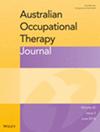‘That connection with community… it is just a positive thing’: Mentoring autistic adolescents participating in community coding programmes
Abstract
Introduction
Little is known regarding the experiences of mentoring autistic adolescents. The aim of the study was to explore the process of mentoring autistic youth participating in community coding programmes through the perspective of mentors and facilitators.
Method
A descriptive qualitative research design was used involving focus groups or one-on-one interviews with mentors (n = 5) and facilitators (n = 5) volunteering at two community coding programmes in Western Australia and Victoria. Data were thematically analysed through an iterative process.
Consumer and Community Involvement
An autistic individual was involved in piloting the discussion guide for the semi-structured interviews.
Findings
Thematic analysis identified three primary themes, including (1) the mentoring process; (2) Mentor outcomes including sub-themes of development of mentor attributes, professional development and personal wellbeing and satisfaction; and (3) support needs and opportunities.
Conclusion
Practical supports and training within community coding clubs may aid mentors and facilitators in supporting the needs of autistic youth in the community.
PLAIN LANGUAGE SUMMARY
In this project, we explored the views of mentors and facilitators of community coding clubs for autistic adolescents. The community clubs were run on Saturdays for 2–4 hours during school term time. A total of 10 participants (five mentors and five facilitators) agreed to meet with the research team to discuss their experiences. We found that mentors and facilitators needed support to develop their mentoring skills which helped them to grow, made them feel better and gave them a feeling of satisfaction. Our study showed the importance of understanding autism spectrum and supporting mentors and facilitators. We showed how mentoring programmes are an emerging approach that occupational therapists can engage with to better support autistic youth with their strengths and passions.

 求助内容:
求助内容: 应助结果提醒方式:
应助结果提醒方式:


